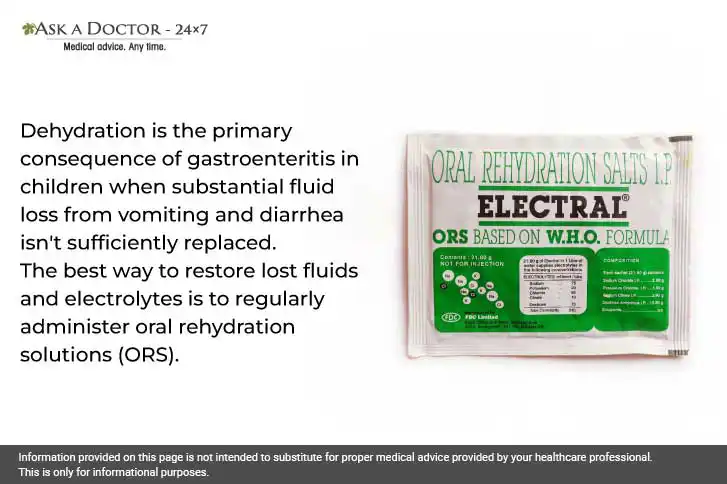Complications Of Gastroenteritis In Children And The Best Solutions
Gastroenteritis, often called stomach flu, is a common illness that produces nausea, vomiting, diarrhea, and abdominal cramping. Vomiting and diarrhea can lead to dehydration and electrolyte imbalance in the body, especially in infants and young children. It is the result of the inflammation of the stomach or intestines caused by germs like bacteria, viruses, or parasites. It isn't serious and typically lasts a few days. Most children recover at home with plenty of rest and fluids.
It is a contagious disease. The most common cause of gastrointestinal infection is contaminated food or water. Additionally, you can contract it by coming into contact with an infected person or touching a surface that they have touched. Here in this blog, find out about various aspects of gastroenteritis in children, including gastroenteritis symptoms, complications, and management tips.
Symptoms of Gastroenteritis in Children
The typical symptoms of gastroenteritis, regardless of cause, are vomiting and diarrhea. Gastroenteritis resulting from a viral or bacterial infection can also cause fever. Abdominal pain is also common.
Common symptoms of gastroenteritis are usually a combination of:
- Nausea and vomiting
- Diarrhea
- Abdominal pain and cramps
- Fever
- Rapid breathing
- Shortness of breath
- Poor appetite
- Fatigue and body aches
Complications of Gastroenteritis
Most of the time, gastroenteritis is brief and ends by itself. However, infants and children are more vulnerable if excess fluid is lost from the body.
1. Dehydration: It is the most common complication of gastroenteritis, caused when the body doesn’t have enough fluids to function properly. Classic signs of dehydration include:
- Dry lips or mouth
- Eyes that look sunken or pale
- The sunken soft spot (fontanelle) on top of the head looks sunken in the infant
- Dark-colored urine. The child is urinating less often (more than 4–6 hours for infants and 6–8 hours for older kids).
- Crying infrequently or not at all, feeling lightheaded or dizzy
- Being cranky, extremely drowsy, or less attentive.
- Has a high temperature.
2. Ulcers: Long-lasting gastroenteritis (usually the duration of gastroenteritis is limited) may tend to harm the intestines and stomach. For instance, a child may get bleeding ulcers in the organs.
3. Metabolic acidosis: In severe dehydration, the kidneys struggle to filter waste products like hydrogen ions effectively, causing the accumulation of acids in the bloodstream. Metabolic acidosis is characterized by a pH less than 7.35 and a low HCO3 level.
4. Electrolyte disturbance: Post severe dehydration, there is an electrolyte imbalance causing hypernatraemia (high sodium levels), hyponatraemia (low sodium levels), hypokalaemia (low potassium levels).
5. Intolerance to carbohydrates (lactose, glucose): It is caused due to disruption of the normal digestive process.
6. Potential for reinfection: Due to a weakened immune system, our body becomes vulnerable to further infections. Lactose intolerance: Intolerance to cow's milk, soy protein, etc.
7. Hemolytic uraemic syndrome (HUS): It is particularly caused by a bacterial infection, a certain type of E.coli bacteria. It can lead to life-threatening complications, including kidney failure, heart problems, and neurological issues.
Solutions To Treat and Prevent Gastroenteritis

There is no particular treatment for gastroenteritis, and most children can be treated at home. However, children who are more severely dehydrated may require hospital or emergency room treatment.
Ways to tackle dehydration in children at home:
- Oral rehydration solutions: Oral (by mouth) rehydration is used to treat mild dehydration. Oral rehydration solution has the proper proportions of salt, sugar, and water to aid in dehydration. It is available without a prescription in pharmacies and supermarkets. You can also consult your physician if you are unable to obtain oral rehydration solution. If your child is throwing up, start with small sips, about 1 or 2 teaspoons every few minutes.
- Fluid replacement: Babies can continue to breastfeed or take formula as long as they are not experiencing frequent vomiting. Fluid replacement involves replacing plain water with oral rehydration solution, diluted fruit juice, or soups. Plain water doesn't have the right nutrients for babies with dehydration.
- Avoid giving your child soda, sports drinks, or full-strength (undiluted) juice. Due to their high sugar content, these sugar-loaded drinks can exacerbate diarrhea.
- Make your child get ample rest: Getting plenty of rest allows the body to fully recover.
- Over-the-counter medications or guided by a healthcare professional: Pain/fever medication such as acetaminophen can ease fever, aches, and pains. Antiemetics can reduce vomiting. Zinc supplements can reduce the duration and severity of diarrhea.
- Diet modifications: Once the child can handle easily digestible food items, gradually resume a regular diet. Start with simple, indigestible items like toast, rice, and bananas.
- Rotavirus vaccine: Get your child a rotavirus vaccination to protect against viral gastroenteritis caused by rotavirus.
Conclusion
Hence, viral gastroenteritis usually resolves on its own. Giving your child enough rest and fluids, including oral rehydration solution, is the best method to aid in its recovery. You may limit your child’s diet to simple, easy-to-digest items. Look for the signs of dehydration in your child, such as dry mouth and skin, marked thirst, sunken eyes, or crying without tears. In an infant, be alert to the soft spot on the top of the head becoming sunken and to diapers that remain dry for more than three hours. Don’t forget to consult your child’s doctor if the condition doesn’t improve. They may need to treat a child with severe dehydration in a hospital as an emergency.
If you have any questions related to gastroenteritis and its potential complications, you can Ask a Pediatric Gastroenterologist at Ask a Doctor, 24x7.
Recently Answered Queries Related to Pediatric Gastroenterologist
- What Causes Severe Vomiting And Diarrhea In Children?
- What Causes Loose Motions In Children Despite Having Healthy Food?
- What Is The Duration Of Treatment With Entrogermina For Loose Motion In Children?
- Can Bifilac Be Given For Loose Motions In Children?
- Is Sporlac Advisable For Loose Motions In Children?
- Is Lanzol, Advised For Loose Motions In Children?
- Child Having Dark, Smelly Stools, Has Eczema All Over Body And Face Causing Intense Itching. Cause?
- What Causes Smelly Stools?
- What Causes Smelly Stools In A Child?
Disclaimer: Information provided on this page is not intended to substitute for proper medical advice provided by your healthcare professional. This is only for informational purposes.
Ask a Specialist
Recent Questions


